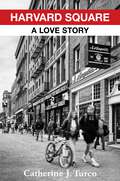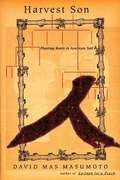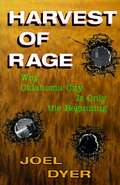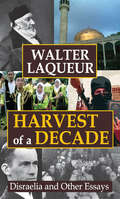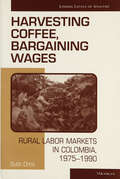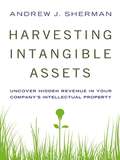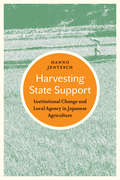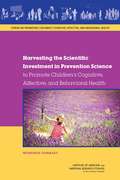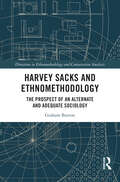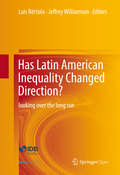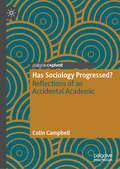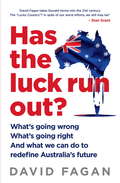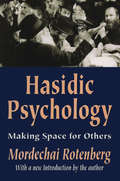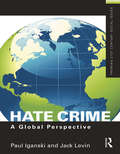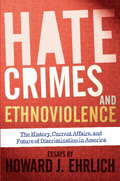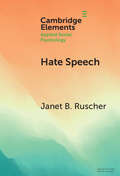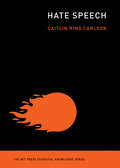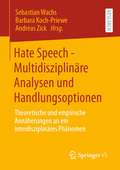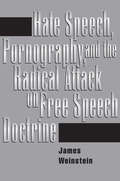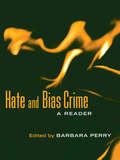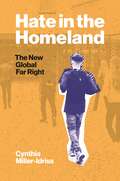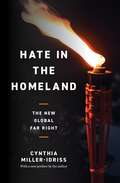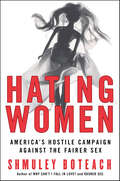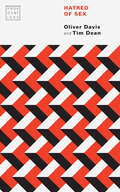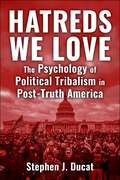- Table View
- List View
Harvard Square: A Love Story
by Catherine J. Turco“Harvard Square isn’t what it used to be.” Spend any time there, and you’re bound to hear that lament. Yet people have been saying the very same thing for well over a century. So what does it really mean that Harvard Square—or any other beloved Main Street or downtown—“isn’t what it used to be”? Catherine J. Turco, an economic sociologist and longtime denizen of Harvard Square, set out to answer this question after she started to wonder about her own complicated feelings concerning the changing Square.Diving into Harvard Square’s past and present, Turco explores why we love our local marketplaces and why we so often struggle with changes in them. Along the way, she introduces readers to a compelling set of characters, including the early twentieth-century businessmen who bonded over scotch and cigars to found the Harvard Square Business Association; a feisty, frugal landlady who became one of the Square’s most powerful property owners in the mid-1900s; a neighborhood group calling itself the Harvard Square Defense Fund that fought real estate developers throughout the 1980s and ’90s; and a local businesswoman who, in recent years, strove to keep her shop afloat amid personal tragedy, the rise of Amazon, and a globalizing property market that sent her rent soaring.Harvard Square tells the crazy, complicated love story of one quirky little marketplace and in the process, reveals the hidden love story Americans everywhere have long had with their own Main Streets and downtowns. Offering a new and powerful lens that exposes the stability and instability, the security and insecurity, markets provide, Turco transforms how we think about our cherished local marketplaces and markets in general. We come to see that our relationship with the markets in our lives is, and has always been, about our relationship with ourselves and one another, how we come together and how we come apart.
Harvest Son: Planting Roots in American Soil
by David Mas MasumotoA Japanese-American farmer offers a tribute to family, farm and community. In prose of zen-like calm and clarity, Masumoto relates how he learned how to prune vines and survive a storm; to value the knowledge of old farmers and rusty tools; and to take on a leadership role in his Buddhist community.
Harvest of Rage
by Joel DyerIn its September 1997 issue, Soldier of Fortune Magazine suggested reading "Harvest of Rage" might be an appropriate and timely wake-up call for the Clinton Administration. In this book, Rocky Mountain News editor Joel Dyer through interviews and seemingly well-documented research describes the antigovernment movement in America today. Dyer dispells the myth that antigovernment movement members are rabid beer-swilling Bubus, and ably places the development of the movement in perspective in terms of the Farm Crisis, Federal Reserve policy, and the increased domination of agriculture by the multinational agribusiness concerns. Though Dyer may have his own agenda, the book presents the reality of the antigovernment movement's actions as well as the forces operating on the people involved.
Harvest of a Decade: Disraelia and Other Essays
by Walter LaqueurThis is a selection of essays written during the first decade of the twenty-first century, by a figure widely acknowledged as the conscience of European liberalism. In Walter Laqueur's lifetime, there have been more acutely dangerous situations, such as the coming of a world war or the seemingly unstoppable march to victory of totalitarian regimes, than in any other previous epoch. Such immediate dangers may not exist at the present time. But long-term trends are equally or even more threatening, as we now see in the ability of small groups of people, unprecedented in history, to inflict enormous damage. This is the underlying essence of Laqueur's thinking, as expressed in this new volume. As Laqueur observes, one learns from long experience that the worst does not always happen, and if it does, probably not in one's lifetime. Ideas and intellectual fashions emerging from the groves of academe, particularly in America can seem wrongheaded and often out of touch with the real world. This growing isolation causes growing bitterness, alienation, and a feeling of impotence on the part of intellectuals, which turns into greater radicalization and farfetched thinking. Laqueur fortunately does not fall into this trap. The articles and essays selected for this volume deal with a variety of topics. They do not entirely reflect Laqueur's interests, which during this period were more in the cultural field than in politics. However, politics intrude irrespective of the author's predilections. Laqueur deals with unpleasant truths in concrete geopolitical settings, but poignantly takes his stand with the men and women who strive to overcome self-censorship in the search for accurate judgment.
Harvesting Coffee, Bargaining Wages: Rural Labor Markets in Colombia, 1975-1990 (Linking Levels Of Analysis)
by Sutti OrtizHarvesting Coffee, Bargaining Wages offers an insightful scrutiny of rural market behavior and a convincing explanation of why farmers fail sometimes to manage their laborers in ways predicted by market models--and how power imbalances and social conditions can impair the ability of laborers to attain a fair market contract during lax labor market periods. This empirical study, based on interviews with both farmers and laborers, covers a fifteen-year period characterized by the modernization of production. Ortiz compares three localized coffee labor markets, expanding the analysis by contrasting the strategies used by the coffee farmers in her study areas with those that farmers in other parts of the world adopt in order to cope with similar problems. Her data challenge prevalent generalizations about the consequences of agricultural modernization on laboring families by showing that management practices and contractual arrangements are ultimately molded by local conditions--cultural perceptions of a fair exchange, familial obligations and roles, availability of housing, bargaining power in the home and in the market, kin networks, and information flows--in interaction with national and global influences. Harvesting Coffee, Bargaining Wages will be of primary interest to anthropologists and sociologists, geographers, political scientists interested in explicit and implicit contract formats, and economists intrigued by the possibility of integrating social variables as contextual aspects of management strategies. Sutti Ortiz is Associate Professor Emerita of Anthropology, Boston University.
Harvesting Intangible Assets: Uncover Hidden Revenue in Your Company's Intellectual Property
by Andrew ShermanWhether you call it &“harvesting intangible assets&” or &“intellectual property management,&” organizations must make the most of everything they have to remain competitive and experience continual growth.In this thought-provoking book, author Andrew J. Sherman shares insights and expertise gleaned from his work with some of the world&’s leading companies who have capitalized on intellectual assets such as patents, trademarks, customer information, software codes, databases, business models, home-grown processes, and employee expertise.Featuring instructive examples from organizations including Proctor & Gamble, IBM, and Google, Harvesting Intangible Assets reveals how companies large or small can uncover their intellectual property rights that are hiding just below the strategic surface. You&’ll learn how to:implement IP-driven growth and licensing strategies,foster a culture of innovation,turn research and development into revenue,and maximize your company&’s profits.Smart companies reap what they sow. Harvesting Intangible Assets gives readers the tools they need for a profitable harvest.
Harvesting State Support: Institutional Change and Local Agency in Japanese Agriculture (Japan and Global Society)
by Hanno JentzschAgriculture has been among the toughest political battlegrounds in postwar Japan and represents an ideal case study in institutional stability and change. Inefficient land use and a rapidly aging workforce have long been undermining the economic viability of the agricultural sector. Yet vested interests in the small-scale, part-time agricultural production structure have obstructed major reforms. Change has instead occurred in more subtle ways. Since the mid-1990s, a gradual reform process has dismantled some of the core pillars of the postwar agricultural support and protection regime. Harvesting State Support analyzes this process by shifting the analytical focus to the local level. Drawing on extensive qualitative field research, Hanno Jentzsch investigates how local actors, including farmers, local governments, and local agricultural cooperatives, have translated abstract policies into local practice. Showing how local variants are constructed through recombining national reforms with the local informal institutional environment, Harvesting State Support reveals new links between agricultural reform and other shifts in Japan’s political economy.
Harvesting the Scientific Investment in Prevention Science to Promote Children's Cognitive, Affective, and Behavioral Health: Workshop Summary
by Margie PatlakOver the past few decades there have been major successes in creating evidence-based interventions to improve the cognitive, affective, and behavioral health of children. Many of these interventions have been put into practice at the local, state, or national level. To reap what has been learned from such implementation, and to explore how new legislation and policies as well as advances in technology and analytical methods can help drive future implementation, the Institute of Medicine-National Research Council Forum on Promoting Children's Cognitive, Affective, and Behavioral Health held the workshop "Harvesting the Scientific Investment in Prevention Science to Promote Children's Cognitive, Affective, and Behavioral Health" in Washington, DC, on June 16 and 17, 2014. The workshop featured panel discussions of system-level levers and blockages to the broad implementation of interventions with fidelity, focusing on policy, finance, and method science; the role of scientific norms, implementation strategies, and practices in care quality and outcomes at the national, state, and local levels; and new methodological directions. The workshop also featured keynote presentations on the role of economics and policy in scaling interventions for children's behavioral health, and making better use of evidence to design informed and more efficient children's mental health systems. "Harvesting the Scientific Investment in Prevention Science to Promote Children's Cognitive, Affective, and Behavioral Health" summarizes the presentations and discussion of the workshop.
Harvey Sacks and Ethnomethodology: The Prospect of an Alternate and Adequate Sociology (Directions in Ethnomethodology and Conversation Analysis)
by Graham ButtonEthnomethodology and Conversation Analysis have made major inroads into the disciplines that make up the social sciences. Although commonly run together under the title of EMCA, what their relationship is to one another remains as elusive as the relationship between their respective founders, Harold Garfinkel and Harvey Sacks.This book clarifies the nature of these relationships, demonstrating that Harvey Sacks’ studies of the sequential organisation of conversation are the cardinal example of what Garfinkel described as an ethnomethodological alternate to traditional social science. However, over the decades that have passed since Garfinkel developed ethnomethodology, several confusions have arisen as to what he meant. The author argues that these have resulted in a blunting of Garfinkel’s original intentions which compromise the adequacy of ethnomethodological description. In response, this book shows how Sacks’ considerations of adequacy can ground ethnomethodology as a “natural observational science” that redirects it towards developing further coherent and precisely circumscribed bodies of work to those of Sacks’ own coherent and precisely circumscribed studies.It will appeal to both new and existing scholars of ethnomethodology and conversation analysis, as well as those with interests in social theory, methodology, and those who have taken up the relevance of conversation analysis for their research and are interested in the ethnomethodological heritage of conversation analysis.
Has Latin American Inequality Changed Direction?
by Luis Bértola Jeffrey WilliamsonThis book is open access under a CC BY 4. 0 license. This book brings together a range of ideas and theories to arrive at a deeper understanding of inequality in Latin America and its complex realities. To so, it addresses questions such as: What are the origins of inequality in Latin America? How can we create societies that are more equal in terms of income distribution, gender equality and opportunities? How can we remedy the social divide that is making Latin America one of the most unequal regions on earth? What are the roles played by market forces, institutions and ideology in terms of inequality? In this book, a group of global experts gathered by the Institute for the Integration of Latin America and the Caribbean (INTAL), part of the Inter-American Development Bank (IDB), show readers how various types of inequality, such as economical, educational, racial and gender inequality have been practiced in countries like Brazil, Bolivia, Chile, Mexico and many others through the centuries. Presenting new ideas, new evidence, and new methods, the book subsequently analyzes how to move forward with second-generation reforms that lay the foundations for more egalitarian societies. As such, it offers a valuable and insightful guide for development economists, historians and Latin American specialists alike, as well as students, educators, policymakers and all citizens with an interest in development, inequality and the Latin American region.
Has Sociology Progressed?: Reflections of an Accidental Academic
by Colin CampbellLooking back over the last 60 years of sociology in the UK, this book addresses the question of progress in the discipline. Campbell's critical and autobiographical reflections offer fresh insights into the history of sociology, and engages with the notion of academic reputation, how it is measured, and what it can tell us about scholarly progress. Has Sociology Progressed? will be of special interest to all sociologists and would-be sociologists interested in the past, present and future of their discipline, as well as scholars contemplating academic progress and motivation in general.
Has the Luck Run Out?: What we can do to redefine Australia's future
by David FaganWhy are Australians anxious and pessimistic?Who or what has caused our loss of trust in Australia?Why has a feeling of powerlessness crept in for so many? Has the luck really run out for the lucky country?And what can we do to get it back? Every generation believes its forebears have messed up the planet. That's how we evolve.But the mood in Australia at the moment, for all ages, seems one of gloom. People are angry. Distrustful. And not just because we are losing Prime Ministers faster than we are losing wickets!Sport, business, education, banking, farming, religion, trade unions, charities and hospitals have all lost their way through a series of scandals that we must learn from. And disillusion with our leaders is at its peak. Policy has been replaced by politicking.Commentator, author and former newspaper editor David Fagan asks the questions we all want answered as he traces the not-so-gentle decline of important Australian institutions. Through analysis and interviews with experts he explores what has defined Australia in the past and how we want to be defined in the future. Peeling back the rot that has contaminated almost everything Australians believe in, he asks: are we still the economically, socially and culturally strong country that most aspire to? Should we be alarmed? Or has the laconic Australian drifted from believing 'she'll be right' to being a 'bloody knocker'?Has the Luck Run Out? shines a spotlight on the mistakes we have made, our national disillusion and looks to what can be done to re-set the mood of the times. And, more importantly, what we have to do to set things right.
Hasidic Psychology: Making Space for Others
by Mordechai RotenbergInterest in the impact of ethical systems and social or religious ideologies on socio-behavioral patterns is a longstanding theme in social science research. While interest may have begun with Max Weber and his thesis of the relationship between the Protestant ethic and the spirit of capitalism, it extends far beyond this. Surprisingly, few studies have delved into the socio-behavioral patterns emanating from Jewish ethics. This book, with a new introduction by the author, fills that gap.As Hasidic Psychology makes clear, Jewish ethics are unique in many ways, especially in that they are essentially other-centered. Man's ability to affect his own future and interpersonal relations are explained according to the theory of contraction, popularized in Hasidic thought: God, by contracting Himself to evacuate space for the human world, bestowed upon man the power and responsibility to determine his own future, and even affect God's disposition.In the first part of the book, the sociological-structural concept of mono versus multiple ideal labeling is introduced. This concept refers to a social system in which diverse material and spiritual actualization patterns are structurally introduced as equal social ideals. In the second part, basic tenets of classic interaction and socialization are compared to the interpersonal perspective, and the contraction theory is explained as a process of "mutual emulation," whereby father and son affect each other. In the third part, a functional approach to deviance is developed through the Hasidic process known as "ascend via descend."
Hate Crime: A Global Perspective (Framing 21st Century Social Issues)
by Jack Levin Paul IganskiThis short, accessible text takes on the global and pervasive phenomenon of hate crimes and hypothesizes potential fixes. Iganski and Levin detail evidence of hate violence in the 21st century, particularly religious hatred, ethnic, racial and xenophobic hatred, violence on the basis of sexual orientation and sexual identity, disablist violence, and violence against women, using the most recently published data from cross-national surveys produced by international organizations. This is an ideal addition to any course on social problems, violence, or hate crimes.
Hate Crimes and Ethnoviolence: The History, Current Affairs, and Future of Discrimination in America
by Howard J. EhrlichIlluminating and empirically grounded collection of essays by noted scholar and activist Howard Ehrlich, who chronicles his unparalleled experience in ethnoviolence and hate crimes research
Hate Speech (Elements in Applied Social Psychology)
by Janet B. RuscherHate speech comprises any form of hateful or contemptuous expression that attacks, degrades, or vilifies people based on their social identities. This Element focuses on hate speech targeting social identities that are devalued by a society's dominant groups, and that is likely to evoke, promote, or legitimize harms such violence, discrimination, and oppression. After detailing the ways in which hate speech is expressed (e.g., through derogatory labels, metaphors, offensive imagery), the production of hate speech is explored at theindividual level (e.g., prejudiced attitudes), group level (e.g., realistic intergroup threat), and societal level (e.g., hierarchy maintenance; free speech protections). A discussion of the effects of blatant and anonymous hate speech on targets (e.g., anxiety and depression) and nontargets (e.g., stereotype activation; desensitization; fomenting violence) follows. Finally, the effectiveness of mitigation efforts isexplored, including use of computer-based technologies, speech codes, confrontation, and counterspeech.
Hate Speech (The MIT Press Essential Knowledge series)
by Caitlin Ring CarlsonAn investigation of hate speech: legal approaches, current controversies, and suggestions for limiting its spread.Hate speech can happen anywhere--in Charlottesville, Virginia, where young men in khakis shouted, "Jews will not replace us"; in Myanmar, where the military used Facebook to target the Muslim Rohingya; in Capetown, South Africa, where a pastor called on ISIS to rid South Africa of the "homosexual curse." In person or online, people wield language to attack others for their race, national origin, religion, gender, gender identity, sexual orientation, age, disability, or other aspects of identity. This volume in the MIT Press Essential Knowledge series examines hate speech: what it is, and is not; its history; and efforts to address it.
Hate Speech - Multidisziplinäre Analysen und Handlungsoptionen: Theoretische und empirische Annäherungen an ein interdisziplinäres Phänomen
by Sebastian Wachs Andreas Zick Barbara Koch-PrieweDass Hate Speech ein zentrales wie hoch relevantes Thema ist, bedarf kaum noch der Erwähnung, weil sie in den letzten Jahren mit einer zunehmenden Polarisierung und Radikalisierung in vielen Gesellschaften präsenter geworden ist. Da sich in den letzten Jahren ganz unterschiedliche Disziplinen unabhängig voneinander dem Phänomen „Hate Speech“ genähert haben, erscheint ein interdisziplinärer Überblick zu diesem Thema notwendig. In diesem Sammelband tragen Expert*innen Beiträge zu Definitionen, Möglichkeiten der theoretischen und empirischen Bearbeitung sowie Handlungsoptionen zusammen. In dem ersten Abschnitt werden multidisziplinäre Analysen präsentiert, wobei es u.a. um Forschung, Modelle und Theorien zu Hate Speech geht. In dem zweiten Abschnitt stehen die Konsequenzen und praktische Reaktionsmöglichkeiten auf Hate Speech sowie Einblicke in die Präventionsarbeit im Vordergrund. Das Ziel des Sammelbands ist es, Wissen, Erfahrungen und Ideen zu bündeln und die Leser*innen zu weiter gehenden Reflexionen anzuregen.
Hate Speech, Pornography, and Radical Attacks on Free Speech Doctrine
by James Weinstein<p>Does American free speech doctrine discriminate against women and minorities? In Hate Speech, Pornography, and the Radical Attack on Free Speech Doctrine, James Weinstein carefully examines the charge that in interpreting the First Amendment as protecting hate speech and pornography while allowing myriad other exceptions to free speech, American courts have privileged the interests of the rich and powerful over the interests of women and people of color. The author concludes that while free speech doctrine is not in any deep sense as neutral as some of its apologists believe, the claim that free speech decisions and principles systematically discriminate against women and minorities does not withstand scrutiny. He shows that this claim of discrimination is based upon a profound but widely shared misunderstanding of the actual workings of free speech doctrine.In order to expose this misunderstanding, the first section of the book thoroughly explores the basic cases and principles upon which free speech doctrine is built. The second section demonstrates that the relationship between free speech and equality is far more complex than either radical critics or many liberal defenders of doctrine suppose. <p>The third section considers the cost and benefits of modifying free speech doctrine to allow for the suppression of hate speech and pornography. After reviewing the experience of hate speech and pornography in other democracies, Weinstein concludes that while such a modification would not lead straight to totalitarianism as alarmist defenders of current doctrine contend, it would nonetheless likely inhibit legitimate debate and artistic expression. Also contrary to dogmatic defenders of current doctrine, the author concludes that although the scientific evidence that pornography causes violence to women is not nearly as conclusive as radical feminists assert, this evidence is nonetheless cause for concern. <p>While offering a scholarly analysis of the radical critique of free speech doctrine, this book has even larger ambition: to provide nonlawyers with the background to participate knowledgeably in the continuing debate about the role of free speech in a democratic society.</p>
Hate and Bias Crime: A Reader
by Barbara PerryCovering everything from hate groups and extremist exploits to Black church arsons and the fall out violence from 9/11; this is an important collection that sheds much-needed light on this growing problem.
Hate in the Homeland: The New Global Far Right
by Cynthia Miller-IdrissA startling look at the unexpected places where violent hate groups recruit young people <P><P> Hate crimes. Misinformation and conspiracy theories. Foiled white-supremacist plots. The signs of growing far-right extremism are all around us, and communities across America and around the globe are struggling to understand how so many people are being radicalized and why they are increasingly attracted to violent movements. Hate in the Homeland shows how tomorrow's far-right nationalists are being recruited in surprising places, from college campuses and mixed martial arts gyms to clothing stores, online gaming chat rooms, and YouTube cooking channels. Instead of focusing on the how and why of far-right radicalization, Cynthia Miller-Idriss seeks answers in the physical and virtual spaces where hate is cultivated. Where does the far-right do its recruiting? When do young people encounter extremist messaging in their everyday lives? Miller-Idriss shows how far-right groups are swelling their ranks and developing their cultural, intellectual, and financial capacities in a variety of mainstream settings. She demonstrates how young people on the margins of our communities are targeted in these settings, and how the path to radicalization is a nuanced process of moving in and out of far-right scenes throughout adolescence and adulthood. Hate in the Homeland is essential for understanding the tactics and underlying ideas of modern far-right extremism. This eye-opening book takes readers into the mainstream places and spaces where today's far-right is engaging and ensnaring young people, and reveals innovative strategies we can use to combat extremist radicalization.
Hate in the Homeland: The New Global Far Right
by Cynthia Miller-IdrissA startling look at the unexpected places where violent hate groups recruit young peopleHate crimes. Misinformation and conspiracy theories. Foiled white-supremacist plots. The signs of growing far-right extremism are all around us, and communities across America and around the globe are struggling to understand how so many people are being radicalized and why they are increasingly attracted to violent movements. Hate in the Homeland shows how tomorrow's far-right nationalists are being recruited in surprising places, from college campuses and mixed martial arts gyms to clothing stores, online gaming chat rooms, and YouTube cooking channels.Instead of focusing on the how and why of far-right radicalization, Cynthia Miller-Idriss seeks answers in the physical and virtual spaces where hate is cultivated. Where does the far right do its recruiting? When do young people encounter extremist messaging in their everyday lives? Miller-Idriss shows how far-right groups are swelling their ranks and developing their cultural, intellectual, and financial capacities in a variety of mainstream settings. She demonstrates how young people on the margins of our communities are targeted in these settings, and how the path to radicalization is a nuanced process of moving in and out of far-right scenes throughout adolescence and adulthood.Hate in the Homeland is essential for understanding the tactics and underlying ideas of modern far-right extremism. This eye-opening book takes readers into the mainstream places and spaces where today's far right is engaging and ensnaring young people, and reveals innovative strategies we can use to combat extremist radicalization.
Hating Women: America's Hostile Campaign Against the Fairer Sex
by Shmuley BoteachFrom the author of the internationally bestselling Kosher Sex. A wake-up call about the growing trend of misogyny in our culture-as evidenced by the flood of reality TV shows, ads, and lyrics that portray women as brainless bimbos, or worse Shmuley Boteach, the social commentator and outspoken relationship guru, shares his grave concerns about our society's growing contempt for women. Turn on the television: Reality TV shows such as The Bachelor, For Love or Money, and Average Joe boost their ratings by showing attractive women in competition for one man, one man's money, or both. On a "quest for true love," these women quickly devolve into a pit of vipers-and millions of Americans tune in each week for more. During commercial breaks, women are objectified to sell beer, cars, and every other product under the sun. Flip on the radio: Women are bitches, hos, and gold diggers, at least if you listen to the rap lyrics pumping out into our mass consciousness. And female pop stars like Britney and Madonna, says Boteach, have pushed the envelope past provocative and into the downright pornographic. 'Tween girls across the country follow their lead, and standards for how women should be treated plummet.Perhaps one of the most troubling aspects of this trend, he says, is women's complicity in their own degradation. Either they've become resigned to base stereotypes, or worse, they've bought into these mass market values (hence the deluge of shows like The Swan and Extreme Makeover, on which female contestants insist they need a new nose, teeth, or boobs to feel a positive sense of self-esteem). "There are strong consequences," writes Boteach, "in a world where men have no respect for women and women have no respect for themselves." Greedy gold diggers, brainless bimbos, publicity prostitutes, and backstabbing bitches-are these the stereotypes we want our sons and daughters bombarded by as they grow up? Hating Women offers a vision of how we can correct this downward spiral-along with a strong argument for why we absolutely must.
Hatred of Sex (Provocations)
by Tim Dean Oliver DavisHatred of Sex links Jacques Rancière&’s political philosophy of the constitutive disorder of democracy with Jean Laplanche&’s identification of a fundamental perturbation at the heart of human sexuality. Sex is hated as well as desired, Oliver Davis and Tim Dean contend, because sexual intensity impedes coherent selfhood and undermines identity, rendering us all a little more deplorable than we might wish. Davis and Dean explore the consequences of this conflicted dynamic across a range of fields and institutions, including queer studies, attachment theory, the #MeToo movement, and &“traumatology,&” demonstrating how hatred of sex has been optimized and exploited by neoliberalism. Advancing strong claims about sex, pleasure, power, intersectionality, therapy, and governance, Davis and Dean shed new light on enduring questions of equality at a historical moment when democracy appears ever more precarious.
Hatreds We Love: The Psychology of Political Tribalism in Post-Truth America
by Stephen J. DucatAn in-depth psychological, anthropological, neuroscientific, and historical look at MAGA Republicans and the American Far Right. Fueled by conspiracy thinking and a growing indifference to facts, some Americans, especially on the Right, are increasingly seeing their fellow citizens as threats that must be eliminated. We are witnessing an epidemic of domestic terrorism with a rapidly accumulating body count. This may be the most serious challenge to the integrity of the United States since the Confederate insurrectionists launched their assault on Fort Sumpter in 1861. While an in-depth psychological reading of political events, Hatreds We Love: The Psychology of Political Tribalism in Post-Truth America is grounded in the scholarship and insights of social psychologists, anthropologists, historians, psychoanalysts, neuroscientists, and the many intrepid journalists increasingly threatened by authoritarians who have good reasons to fear truthful reporting. And, of course, author Stephen J. Ducat draws on his own experiences, visions, and values. A major topic addressed in the book is the malignant mindset animating MAGA neo-fascism's zealous partisans. Donald Trump&’s fortunes may fade in the coming months and years, but Trumpism will likely remain ascendant. Of course, xenophobic bigotry, violent aversion to democracy, political cults of personality, and indifference to facts are global phenomena and not limited to the United States. But America plays a prominent role, even abroad. In December 2022, it was revealed that a right-wing coup attempt in Germany was, to some extent, modeled on America&’s own post-election insurrection, which was planned and executed by the paramilitary wing of the MAGA movement. That German episode was not the first time that the actions of American anti-democratic and white supremacist groups became the template for similar efforts worldwide. In the 1930s, German fascists looked to America as a blueprint for implementing race-based tribalism. Hitler so admired Jim Crow laws in the United States, especially concerning citizenship and anti-miscegenation laws, that he sent a team of legal scholars to study their statutory framework for addressing the problem of "racial pollution." While the Nazis initially found a lot to love and incorporate into the Nuremberg Laws, they ironically rejected much of the American model as too harsh. Many pundits have decried the &“extremism&” of Trumpian lynch-mob politics. On the contrary, Hatreds We Love argues that it is contiguous with the long history of American conservatism going back at least to the antebellum South. From this perspective, the worldview and actions of the GOP's MAGA faction are the logical outcomes of the consistently expressed right-wing ethos of domination, xenophobia, and the "freedom" to harm. Although there is much handwringing about the toxic synergy of authoritarian political forces, white identity politics, and the embrace of post-factuality, there is insufficient understanding of the links between them. Chief among those links is tribal psychology. Nearly every political pundit decries political tribalism. Yet, public discussion rarely addresses more than its most disturbing symptoms. Hatreds We Love speaks to the causes and underlying dynamics of what is now one of the greatest threats to the viability of what remains of American democracy and global democratic governance more broadly.
